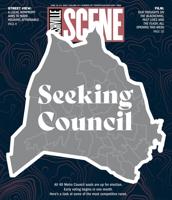In 2018, the Scene dubbed District 1 “The District That Can’t Keep a Representative.”
The district, Metro’s largest, includes Joelton, Beaman Park and part of Bordeaux, spanning a large swath of the northwestern part of Davidson County. Starting in 2015, the district was represented by: Loniel Greene, who resigned a few months after he was elected; fill-in At-Large Councilmember Sharon Hurt; Nick Leonardo, who won a special election but resigned the next year when he was appointed to a judgeship; fill-in At-Large Councilmember (now Mayor) John Cooper; and finally Jonathan Hall, who won a 2018 special election followed by a full four-year term the next year.
Hall, facing a six-figure fine for campaign finance violations, is not running for reelection. Those aiming to succeed him — Ruby Baker, Sean Dailey, Rob Harris, Joy Kimbrough and Timothy Thompson — mostly think that’s a good thing for District 1.
Dailey, who does workforce development and analysis in the construction industry, calls Hall’s tenure “a dereliction.” Harris, a procurement officer for the state’s DeBerry Special Needs Facility, stresses that he does not want to disparage Hall but says the incumbent’s tenure has lacked accessibility, transparency, accountability and communication, all things he says he will bring to the district.
“I really hoped that Jonathan would be the answer,” Harris says.
Baker, a longtime neighborhood association leader in Bordeaux Hills who previously ran for the seat in 2015 and 2018, says, “The community wants someone committed, dedicated and stable,” referencing her decades of work for the state.
District 1 is unique among the city’s 35, with its ample open space and remaining rural areas, plus a large Black population and a history of producing political leaders from that community. Residents in the area, the candidates say, are wary about development, in part because of “the way we get dumped on, literally and figuratively,” according to Kimbrough, alluding to unsavory industrial and waste projects that have been sited or proposed in the district.
Dailey says the next councilmember should treat the district’s natural beauty and open space as a feature. “My vision for District 1 would be to realize those assets and develop them while conserving them,” he says. “If you don’t recognize them as an asset, when this sprawl starts to happen in District 1 as it has in other neighborhoods, you’re going to lose the very thing that makes District 1 great. We have an opportunity to get it right and be one of the best districts in terms of conservation, in terms of being an affordable place for people to live.”
Kimbrough, who as an attorney has represented the families of Nashvillians killed by police officers, jumped in the race just a few days before the qualifying deadline. “It was truly the last minute,” she says. “I had been trying to recruit people to run. … I couldn’t really get anybody to do it. I saw one of [the other candidates] in a picture with a developer. It sparked something in me. It was that quick.”
Like the other candidates, Kimbrough says she does not oppose all development, but “it’s got to be smart growth.” She and Baker both contend that Hall ignored residents and negotiated with developers behind closed doors, something they say they would change.
But Harris, another contender, says his experience “in the backroom meetings” as Mayor John Cooper’s liaison to the Metro Council prior to this current job has helped prepare him to serve on the council. “I’ve seen how the sausage is made,” he says.
Harris is not explicitly running on Cooper’s legacy, though: “I don’t tie myself to Mayor Cooper. I tie myself to my work in the community.”
Harris wants to work on infrastructure in Joelton (a priority mentioned by Baker, too), bring new private- or public-sector tenants to a city-owned former hospital and assisted living campus in the district, and attract limited development to the district’s busiest corridors while limiting growth in other areas.
“The city has given us everything that they don’t want,” Harris says. “We can’t be the solution to everything.”
All 40 Metro Council seats are up for election, and early voting begins in one month






